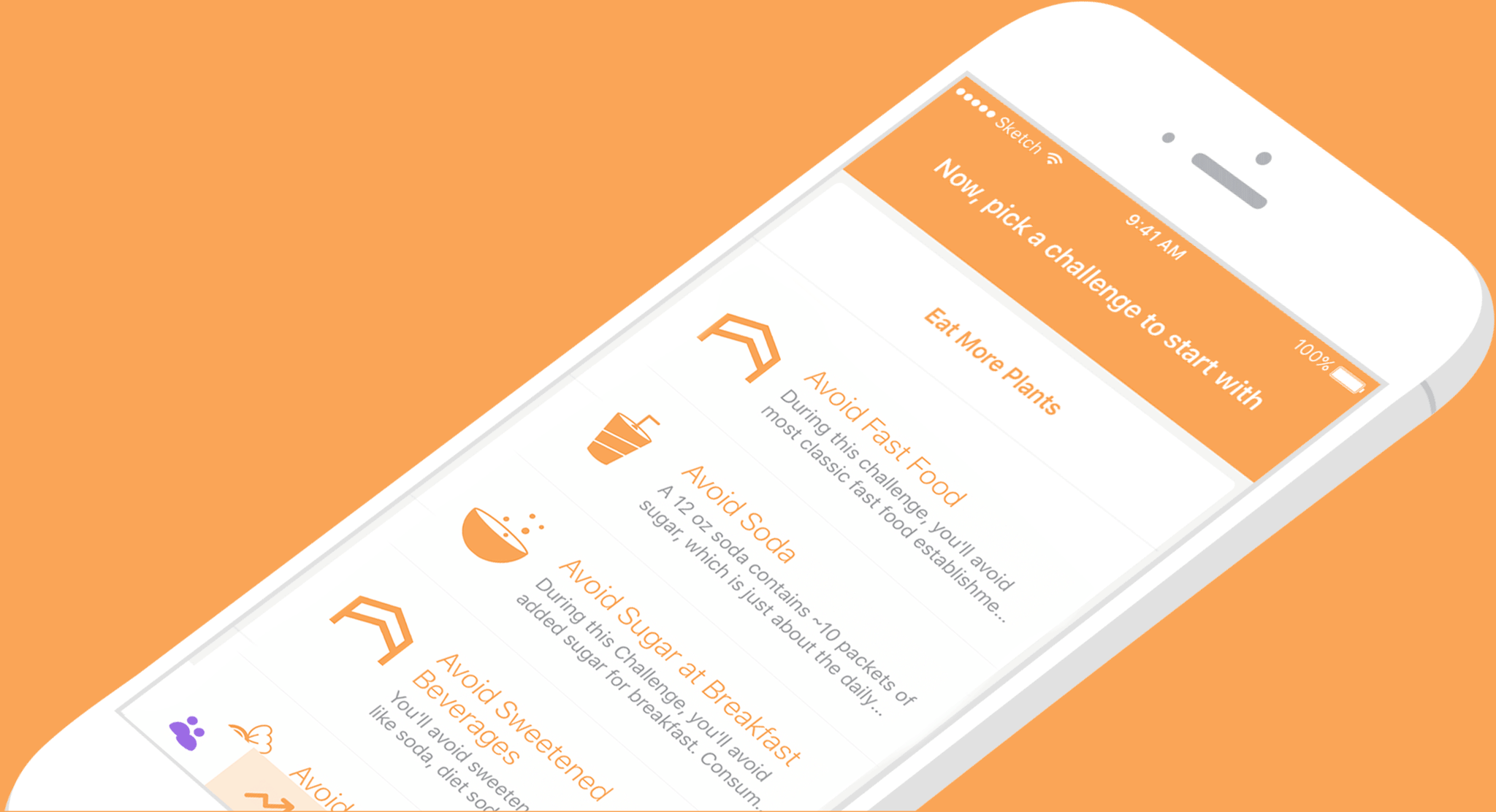Ditch dieting. Build healthy habits instead.
Join a Good Eating Challenge with friends and co-workers, and get healthy once and for all.
What people are saying about us
"I lost 7 kilos in 2 months, and I'm eating a lot of veggies and fruits"
Participating in the Avoid Added Sugar Challenge
"I've been able to create a better healthy eating plan for myself. I've also been better at planning out meals which created better meal budgeting and portion control. I've lost 20 lbs solely due to the challenges from Foodstand."
Participated in the Avoid Added Sugar Challenge, Eat more Fruits and Veggies Challenge
"I've lost 2inches & 3-4kgs. Started eating food more consciously one bite at a time & ate less and more wisely. Even when I was making poor choices in food , I was aware of it & tad guilty too"
Participated in the Avoid Added Sugar Challenge and the One Bite at a Time Challenge
Read more testimonials →
Less Processed Food
Add Fish
Seafood, which includes fish and shellfish, is a heart-healthy alternative to meats, poultry, or eggs. Nutrient benefits include high qua...
Read our guidebook
Avoid Fast Food
Avoid fast food establishments that serve hyper-processed food and factory-farmed meat as often as possible. If you did not eat fast food...
Read our guidebook
Avoid Soda
Swap soda for unsweetened beverages as often as possible. If you did not drink soda, check in at the end of the day. If you do choose to ...
Read our guidebook
Avoid Sugar at Breakfast
Swap out sugary breakfasts (granola, pastries, fruit yogurt, etc.) and replace with unsweetened options (oatmeal without sugar, unsweeten...
Read our guidebook
Avoid Sweetened Beverages
Swap all sweetened beverages (soda, diet soda, juice drinks and energy drinks) with unsweetened ones as often as possible. If you did not...
Read our guidebook
Avoid Sweets, Dessert, and Candy
Avoid desserts, sweets, pastries and candy sweetened with sugar or sweetener (including maple, agave, and honey). Swap in naturally sweet...
Read our guidebook
Cook Dinner More Often
Cook dinner or eat homemade leftovers as many nights of the week as possible. Check in after dinner each night. If you ate out or ordered...
Read our guidebook
Drink 8 Glasses of Water a Day
Drink at least 8 glasses of water per day. Check in after each glass of water you drink.
Read our guidebook
Drink 8 Glasses of Water a Day for 2 weeks
Drink at least 8 glasses of water per day. Check in after each glass of water you drink.
Read our guidebook
Drink Less Booze
Replace the empty calories found in alcohol with seltzer-based mocktails or water. If you did not drink alcohol, check in at the end of t...
Read our guidebook
Eat 2 Servings of Whole Grains A Day
Switching to whole grains (from refined grains) can significantly decrease your risk for obesity, cardiovascular disease, type 2 diabetes...
Read our guidebook
Eat Real Food
Consume only whole foods throughout the day—produce, whole grains, nuts, seeds, unsweetened dairy products, eggs, fish/meat, etc.
Read our guidebook
Increase Fish
Seafood, which includes fish and shellfish, is a heart-healthy alternative to meats, poultry, or eggs. Nutrient benefits include high qua...
Read our guidebook
Make Your Lunch More Often
Make your own lunch by cooking or assembling it, as often as possible. Check in after lunch each day. If you ate out or bought a pre-made...
Read our guidebook
Avoid Added Sugar
Avoid all added sugar and items with added sugar as an ingredient (including maple, agave, and honey). Naturally occuring sugars found in...
Read our guidebook
More Plants
Eat 3 Servings of Fruits & Veggies Per Day
Eat at least 3 servings of fruits and veggies each day. Check in after each serving of fruits and/or vegetables you eat.
Read our guidebook
Eat 5 Servings of Fruits & Veggies Per Day
Eat at least 5 servings of fruits and veggies each day. Check in after each serving of fruits and/or vegetables you eat.
Read our guidebook
Eat 7 Servings of Fruits and Veggies a Day
A diet high in fruits and vegetables can help prevent type 2 diabetes, lower blood pressure, help you maintain a healthy weight, and even...
Read our guidebook
Fill half or more of your plate with Fruits and Veggies
At (minimum) one meal per day, cover at least half of your plate with fruits and/or veggies. Check in after your meal at which you've fil...
Read our guidebook
Fewer animal products
Eat and Drink Less Dairy
A diet free of dairy products leaves more room for foods that optimize health: fiber and nutrient rich whole plant foods like fruits, veg...
Read our guidebook
Eat Fewer Eggs
A diet free of eggs leaves more room for foods that optimize health: fiber- and nutrient rich whole plant foods like fruits, veggies, who...
Read our guidebook
Eat Less Poultry
A diet with less or no meat, including poultry, saves your arteries and helps counteract climate change. During this Challenge, you'll fo...
Read our guidebook
Eat Less Red Meat
Replace red meat with plant-based foods (or fish/eggs) at each meal. If you did not eat meat or meat products, check in at the end of the...
Read our guidebook
Eat Less Seafood
A low fish or fish-free diet can be very protective, depending on what’s in it! A diet based mainly on whole plant foods is your best bet...
Read our guidebook
Eat More Plant-based Proteins
Plant proteins are extremely good for health. Plant sources of protein come packaged with plenty of fiber, protective antioxidants, and p...
Read our guidebook
Remove Dairy
A diet free of dairy products leaves more room for foods that optimize health: fiber and nutrient rich whole plant foods like fruits, veg...
Read our guidebook
Remove Poultry
A diet with less or no meat, including poultry, saves your arteries and helps counteract climate change. During this Challenge, you'll fo...
Read our guidebook
Remove Red Meat
Replace red meat with plant-based foods (or fish/eggs) at each meal. If you did not eat meat or meat products, check in at the end of the...
Read our guidebook
Remove Seafood
A low fish or fish-free diet can be very protective, depending on what’s in it! A diet based mainly on whole plant foods is your best bet...
Read our guidebook
Eat Less Animal Products
Replace all animal products (meat, fish, eggs, dairy products, butter, etc.) with plant-based foods instead. If you did not eat animal pr...
Read our guidebook
Mindful Eating
Eat At Least 1 Distraction-Free Meal Per Day
Eat at least one meal each day without working or looking at technology (computer, TV, or phone). Check in after each distraction-free meal.
Read our guidebook
Eat One Bite At A Time
During each meal, finish your bite before taking another. Check in after each meal at which you ate one bite at a time. If you ate too qu...
Read our guidebook
Eat When You're Hungry
Learn to recognize and respond to hunger signals, to eat more intuitively and mindfully. Every time you eat a meal or snack, ask yourself...
Read our guidebook
No Food Waste
Avoid throwing any food or food scraps in the garbage by reusing leftovers and composting scraps. (Note: bones and fats are exempt as the...
Read our guidebook
Stop Eating 2 Hours Before Bed
Don't eat within 2 hours of going to sleep, as many nights as possible. Check in before going to sleep. Use a free pass if you ate within...
Read our guidebook








